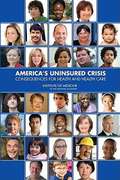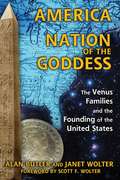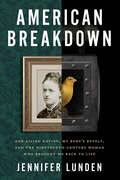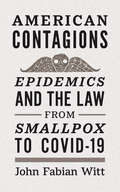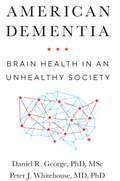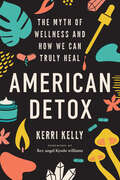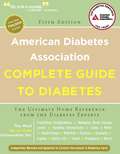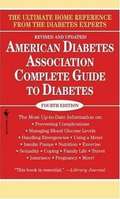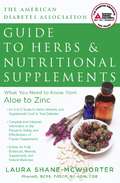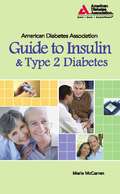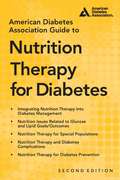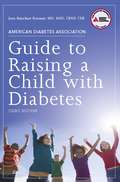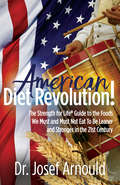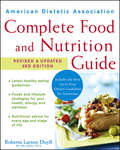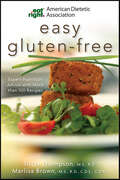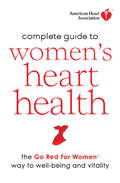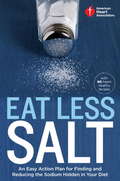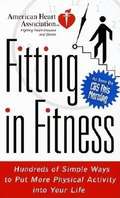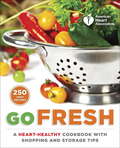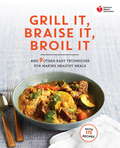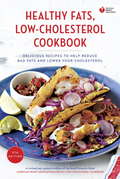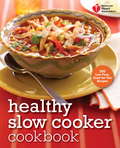- Table View
- List View
America's Uninsured Crisis: Consequences for Health and Health Care
by Institute of MedicineWhen policy makers and researchers consider potential solutions to the crisis of uninsurance in the United States, the question of whether health insurance matters to health is often an issue. This question is far more than an academic concern. It is crucial that U.S. health care policy be informed with current and valid evidence on the consequences of uninsurance for health care and health outcomes, especially for the 45.7 million individuals without health insurance. From 2001 to 2004, the Institute of Medicine (IOM) issued six reports, which concluded that being uninsured was hazardous to people's health and recommended that the nation move quickly to implement a strategy to achieve health insurance coverage for all. The goal of this book is to inform the health reform policy debate--in 2009--with an up-to-date assessment of the research evidence. This report addresses three key questions: What are the dynamics driving downward trends in health insurance coverage? Is being uninsured harmful to the health of children and adults?Are insured people affected by high rates of uninsurance in their communities?
America: The Venus Families and the Founding of the United States
by Alan Butler Janet Wolter Scott F. WolterExplores how a secret cabal of influential families has shaped the United States according to the principles of sacred geometry and Goddess veneration • Exposes the esoteric influences behind the National Grange Order of Husbandry • Examines the sacred design and hidden purpose of the Washington Monument • Reveals how the three obelisks in New York City depict the stars of Orion’s Belt • Explains how every baseball diamond is actually a temple to the Goddess In America: Nation of the Goddess, Alan Butler and Janet Wolter reveal how a secret cabal of influential “Venus” families with a lineage tracing back to the Eleusinian Mysteries has shaped the history of the United States since its founding. The evidence for such incredible assertions comes from American institutions such as the National Grange Order of Husbandry and from the man-made landscape of the United States where massive structures and whole cities conform to an agenda designed to elevate the feminine within religion and society. The authors explain how the Venus families, working through the Freemasons and later the Grange, planned the American Revolution and the creation of the United States. It was this group who set the stage for the Founding Fathers to create Washington, D.C., according to the principles of sacred geometry, with an eye toward establishing the New Jerusalem. The authors explore the sacred design of the Washington Monument, revealing its occult purpose and connections to the heavens. They reveal how the obelisks in New York City depict the stars of Orion’s Belt just like the Giza pyramids and how the site of one of them, St. Paul’s Chapel, is the American counterpart to Rosslyn Chapel in Scotland. Exposing the strong esoteric influences behind the establishment of the Grange in the United States, they connect this apparently conservative order of farmers to the Venus families and trace its lineage back to the Cisterians, who were a major voice in the promotion of the Crusades and the establishment of the Knights Templar. The authors conclude with the startling revelation that nearly every city in America has a temple to the Goddess hidden in plain sight--their baseball diamonds--exposing the extent to which the Venus families are still at work behind the scenes.
American Breakdown: Our Ailing Nation, My Body's Revolt, and the Nineteenth-Century Woman Who Brought Me Back to Life
by Jennifer LundenA Silent Spring for the human body, this wide-ranging, genre-crossing literary mystery interweaves the author’s quest to understand the source of her own condition with her telling of the story of the chronically ill 19th-century diarist Alice James—ultimately uncovering the many hidden health hazards of life in America.When Jennifer Lunden became chronically ill after moving from Canada to Maine, her case was a medical mystery. Just 21, unable to hold a book or stand for a shower, she lost her job and consigned herself to her bed. The doctor she went to for help told her she was “just depressed.”After suffering from this enigmatic illness for five years, she discovered an unlikely source of hope and healing: a biography of Alice James, the bright, witty, and often bedridden sibling of brothers Henry James, the novelist, and William James, the father of psychology. Alice suffered from a life-shattering illness known as neurasthenia, now often dismissed as a “fashionable illness.”In this meticulously researched and illuminating debut, Lunden interweaves her own experience with Alice’s, exploring the history of medicine and the effects of the industrial revolution and late-stage capitalism to tell a riveting story of how we are a nation struggling—and failing—to be healthy.Although science—and the politics behind its funding—has in many ways let Lunden and millions like her down, in the end science offers a revelation that will change how readers think about the ecosystems of their bodies, their communities, the country, and the planet.
American Contagions: Epidemics and the Law from Smallpox to COVID-19
by John Fabian WittA concise history of how American law has shaped—and been shaped by—the experience of contagion“Contrarians and the civic-minded alike will find Witt’s legal survey a fascinating resource”—Kirkus, starred review “Professor Witt’s book is an original and thoughtful contribution to the interdisciplinary study of disease and American law. Although he covers the broad sweep of the American experience of epidemics from yellow fever to COVID-19, he is especially timely in his exploration of the legal background to the current disaster of the American response to the coronavirus. A thought-provoking, readable, and important work.”—Frank Snowden, author of Epidemics and Society From yellow fever to smallpox to polio to AIDS to COVID-19, epidemics have prompted Americans to make choices and answer questions about their basic values and their laws. In five concise chapters, historian John Fabian Witt traces the legal history of epidemics, showing how infectious disease has both shaped, and been shaped by, the law. Arguing that throughout American history legal approaches to public health have been liberal for some communities and authoritarian for others, Witt shows us how history’s answers to the major questions brought up by previous epidemics help shape our answers today: What is the relationship between individual liberty and the common good? What is the role of the federal government, and what is the role of the states? Will long-standing traditions of government and law give way to the social imperatives of an epidemic? Will we let the inequities of our mixed tradition continue?
American Dementia: Brain Health in an Unhealthy Society
by Daniel R. George Peter J. WhitehouseHave the social safety nets, environmental protections, and policies to redress wealth and income inequality enacted after World War II contributed to declining rates of dementia today—and how do we improve brain health in the future?For decades, researchers have chased a pharmaceutical cure for memory loss. But despite the fact that no disease-modifying biotech treatments have emerged, new research suggests that dementia rates have actually declined in the United States and Western Europe over the last decade. Why is this happening? And what does it mean for brain health in the future?In American Dementia, Daniel R. George, PhD, MSc, and Peter J. Whitehouse, MD, PhD, argue that the current decline of dementia may be strongly linked to mid–twentieth century policies that reduced inequality, provided widespread access to education and healthcare, and brought about cleaner air, soil, and water. They also• explain why Alzheimer's disease, an obscure clinical label until the 1970s, is the hallmark illness of our current hyper-capitalist era;• reveal how the soaring inequalities of the twenty-first century—which are sowing poverty, barriers to healthcare and education, loneliness, lack of sleep, stressful life events, environmental exposures, and climate change—are reversing the gains of the twentieth century and damaging our brains;• tackle the ageist tendencies in our culture, which disadvantage both vulnerable youth and elders;• make an evidence-based argument that policies like single-payer healthcare, a living wage, and universal access to free higher education and technical training programs will build collective resilience to dementia;• promote strategies that show how local communities can rise above the disconnection and loneliness that define our present moment and come together to care for our struggling neighbors.Ultimately, American Dementia asserts that actively remembering lessons from the twentieth century which help us become a healthier, wiser, and more compassionate society represents our most powerful intervention for preventing Alzheimer's and protecting human dignity. Exposing the inconvenient truths that confound market-based approaches to memory enhancement as well as broader social organization, the book imagines how we can act as citizens to protect our brains, build the cognitive resilience of younger generations, and rise to the moral challenge of caring for the cognitively frail.
American Detox: The Myth of Wellness and How We Can Truly Heal
by Kerri Kelly&“An intimate, honest, accountable, and thorough invitation into healing&” -- adrienne maree brown, author of Pleasure Activism&“This book is a powerhouse.&” -- Ashley JuddThe myth of wellness is a lie. And until we learn to confront and dismantle its toxic systems, we can&’t ever be well.Better, stronger, healthier, whole--the wellness industry promises us that with enough intention, investment, and positive thinking, we&’ll unlock our best selves and find meaning and purpose in a chaotic and confusing world.The problem? It&’s a lie.The industry soars upwards of $650 billion a year, but we&’re still isolated, insecure, and inequitable. &“Wellness&” isn&’t making us well; it&’s making us worse.It diverts our attention and holds us back from asking the questions that do help us heal: Who gets to be well in America? Who&’s harmed--and who's left out? And what&’s the real-life cost of our obsession with self-improvement?To be truly well, we don&’t need juice fasts or yoga fads. We need to detox from a culture rooted in perfectionism, white supremacy, and individualism--and move toward a model that embodies mutual responsibility and extends beyond self-help to collective care.In American Detox, organizer, yoga activist, wellness disruptor, and CTZNWELL founder Kerri Kelly sounds the wake-up call. It&’s time to commit to the radical work of unlearning the toxic messages we&’ve been fed--to resist, disrupt, and dream better futures of what wellness really means.
American Diabetes Association Complete Guide to Diabetes
by American Diabetes AssociationThe American Diabetes Association-the nation's leading health organization supporting diabetes research, information, and advocacy-has completely revised this comprehensive home reference to provide all the information a person needs to live an active, healthy life with diabetes. Now in its fifth edition, this extensive resource contains information on the best self-care techniques and the latest medical advances. For people with diabetes, this extraordinary guide will answer any question. Topics include the latest on self-care for type 1, type 2, and gestational diabetes; new types of insulin and medications; strategies for avoiding diabetes complications; expanded sections on meal planning and nutrition; and tips on working with the health care system and insurance providers.
American Diabetes Association Complete Guide to Diabetes (3rd Edition)
by American Diabetes AssociationBeginning with the assumption nothing is known about this disease by the reader, the book discusses types of diabetes, treatments, and the value of diet and exercise.
American Diabetes Association Guide to Herbs and Nutritional Supplements
by Laura Shane-McwhorterThe only guide to herbs and supplements for people with diabetes!More and more people are using nutritional supplements and natural remedies for health, but people with diabetes don't always understand how herbs and supplements can affect them. Many supplements can intensify and interfere with prescribed medications for diabetes. The American Diabetes Association Guide to Herbs and Nutritional Supplements lays out, in clear terms, pertinent information about why these popular herbs and nutritional supplements are used and how they affect prescription drugs. Take the guesswork out of taking herbs and supplements with this informative guide.
American Diabetes Association Guide to Insulin and Type 2 Diabetes
by Marie MccarrenUser-friendly guide covers all aspects of insulin use in type 2 diabetesThe American Diabetes Association Guide to Insulin & Type 2 Diabetes addresses common fears about insulin therapy and what is involved with beginning to use insulin. Additional chapters discuss fine-tuning of insulin self-management, gadgets to make life easier, and troubleshooting steps to overcome any problems readers may have.
American Diabetes Association Guide to Nutrition Therapy for Diabetes
by Marion J. Franz Alison EvertDiabetes greatly affects how people's bodies manage the food they eat. It is essential that people with diabetes follow a carefully structured meal plan and learn specific skills in order to better control their blood glucose levels. The tactics for helping people manage their diabetes through how they eat is called medical nutrition therapy (MNT).Here the American Diabetes Association presents all of the key information and strategies for effectively teaching patients how to manage their diets. Drawing on the knowledge and expertise of dozens of experts in the field, this book covers all of the key topics for implementing successful medical nutrition therapy.Topics include:Thorough discussion of nutrientsDescription of MNT for type 1 and type 2 diabetesDiscussion of providing MNT to special populations, including youth and older individualsExplanation of the different complications of diabetes, such as kidney disease, celiac disease, and cystic fibrosis, and how they impact MNTLatest details on new technology used in MNTGuidelines and strategies for teaching patients about nutrition therapy and how to use it in their daily livesUsing MNT to help prevent diabetes
American Diabetes Association Guide to Raising a Child with Diabetes
by Jean Betschart RoemerThe American Diabetes Association Guide to Raising a Child with Diabetes, 3rd edition features the latest advances in diabetes care to help your child have a healthy active childhood. Full of problem-solving examples and easy-to-use tables, you will learn how:To adjust insulin to allow for the foods kids love to eatTo help the child with type 2 diabetesTo plan meals that are nutritious and balancedTo play sports and games safelyTo handle sick daysYour child can maintain a busy schedule and still feel healthy and strongTo negotiate the twists and turns of being "different"To accept the physical and emotional challenges that life has to offerAnd much more
American Diet Revolution!: The Strength for Life Guide to the Foods We Must and Must Not Eat To Be Leaner and Stronger in the 21st Century
by Dr. Josef ArnouldA nutrition expert examines why Americans have been eating poorly and offers easy, money-saving ways to eat better, healthier, more nutritious foods. Obesity, diabetes, dementia, and related epidemics plaguing Americans today are primarily the result of deceptive dietary advice that began in the 1950s. By following that advice faithfully throughout the last half of the twentieth century, most Americans became helpless victims of these diseases. Now, in American Diet Revolution!, Dr. Josef Arnould reveals how Americans can throw off the chains of that 1950s dietary advice, overcome these epidemics, and regain the personal freedom of good health. He conveys why Americans must eliminate the fattening, inflaming, toxic, industrial foodstuffs that have dominated their diets for decades and how they can easily do so. Additionally, American Diet Revolution! shares simple and economical strategies to purchase and prepare nutritious foods to replace the toxic ones of the past. Then, in an empowering finale, Dr. Arnould takes the genre of dietary advice to a new place and demonstrates that, by rejecting the deceitful dietary advice of yesteryear, Americans are inciting a second American Revolution. In the process of creating new diets and new food economics based upon honest nutritional research, Americans are revolting peacefully, but powerfully, against all individuals and organizations that previously maximized their power and profits by colonizing Americans with toxic information, toxic foods, and toxic drugs.
American Dietetic Association Complete Food and Nutrition Guide
by Duyff Roberta Larson Null* Latest healthy eating guidelines * Foods and strategies for your good health * Nutritional advice for every age and stage of life A lifetime of sound, easy, and positive advice on healthy eating'from the world's foremost authority on food and nutrition The choices you make every day about food, nutrition, and health can have a major impact on your life. To find the most reliable nutrition information and sound advice in achieving optimal health, look no further. This comprehensive book from the American Dietetic Association explains everything you need to know about eating healthy, with simple, practical tips and flexible guidelines designed to help you choose nutritious, flavorful, and fun foods to suit your needs and lifestyle at any age. This brand-new edition of the bestselling American Dietetic Association Complete Food and Nutrition Guide offers the most up-to-date nutrition information for the whole family. From the healthiest baby food to eating well in the golden years, this fully revised, quick-access guide features: * New chapters on the use and abuse of supplements (including herbals and other botanicals) and on nutrition and health conditions (including Syndrome X and adult and childhood diabetes) and food-drug interactions * An expanded chapter on women's health and nutrition that covers breast cancer, fibromyalgia, and the link between folic acid and heart disease * The latest on food-borne bacteria and ways to prevent food-borne illness * Help for making the right food choices in restaurants * Facts about functional foods and phytonutrients for health, and nutritious ethnic food choices * What you need to know about food and water safety * American Heart Association, USDA, and American Cancer Society guidelines, as well as the DASH "blood-pressure-lowering" diet * Up-to-date information on food labeling and food allergens and intolerances, including celiac disease * More on managing body weight, the truth about today's popular diets, and controlling emotional overeating * Ways to blend nutrition with great taste'in fun, easy ways * And much more
American Dietetic Association Complete Food and Nutrition Guide, 3rd Edition
by Roberta Larson DuyffWith over 200,000 copies sold in all editions, this award-winning resource from the world's leading authority on food and nutrition is packed with the latest healthy eating advice for those at every age and stage of life. In this completely revised and updated new edition, you'll find up-to-date, evidence-based, practical answers for your many food and nutrition questions. This cornerstone guide from the American Dietetic Association, written by nationally recognized food and nutrition expert and registered dietitian Roberta Duyff, covers the basics on nutrition, managing weight, and healthy eating. It also provides easy steps and how-tos for selecting, preparing, and storing foods safely to get the most nutrition and flavor for your dollar, and more. Comprehensive, accessible, and easy-to-use, this valuable reference shows how to make healthy food choices to fit any lifestyle. How to put the the very latest Dietary Guidelines for Americans on food choices and physical activity into action Latest guidance to prevent and manage today's health concerns, such as heart disease, diabetes, cancer, food allergies, gluten intolerance, lactose intolerance, and many others Simple, practical tips and flexible food and nutrition skills that suit your needs and lifestyle with ways to apply advice from USDA's MyPlate Advice for healthy nutrition, eating, and cooking across the lifespan Covers vegetarian eating, healthy restaurant options, culinary nutrition and skills, healthy weight, nutrition supplements, and more Interactive self-checks and websites to help you assess your own food choices and take steps to healthy eating
American Dietetic Association Easy Gluten-Free: Expert Nutrition Advice with More than 100 Recipes (American Dietetic Association Ser.)
by Shauna James Ahern Tricia Thompson Marlisa BrownFrom the ADA-the complete guide to a healthy gluten-free dietHave you or a family member been diagnosed with celiac disease or non-celiac gluten sensitivity? Are you worried that "gluten-free" means boring, bland, and lacking in nutrition? Worry no more. This book will show you how to bring the benefits of delicious, gluten-free whole grains back into your diet and whip up delicious dishes you'll be proud to share with family and friends. From the foremost authority on nutrition, ADA Easy Gluten-Free arms you with cutting-edge information and easy-to-follow recipes to develop healthy gluten-free meals packed with flavor and variety. Learn about the plethora of gluten-free whole grains: how to select them, cook them, and use them in all your meals and snacks Browse more than 130 nutritious and delicious gluten-free recipes for any of your dining needs, from starters and main courses to sides, breads, and desserts Try simple and tempting dishes such as Sweet Potato Quesadillas , Quinoa with Roasted Garlic and Shrimp, Oatmeal Pear Spice Muffins , and Chocolate Sponge Cake with Chocolate Glaze Learn the basics of healthy gluten-free nutrition, choosing gluten-free ingredients, reading labels, and much more Start with four easy weeks of gluten-free meal plans to help you jumpstart and maintain a healthy gluten-free lifestyle Find easy-to-follow information on how to on how to choose and use tasty gluten-free whole grains, from brown rice and oats to millet, teff, and sorghumSo many quick and easy dishes and creative recipes make the book a must for any culinary library.
American Freemasonry: Its Revolutionary History and Challenging Future
by Margaret C. Jacob Alain De Keghel Arturo De HoyosExplores the American Masonic system and its strengths and failings • Examines the history of Freemasonry in the United States from the colonial era and the Revolutionary War to the rise of the Scottish branch onward • Investigates the racial split in American Freemasonry between black lodges and white and how, unlike French lodges, women are ineligible to become Masons in the U.S. • Reveals the factors that have resulted in shrinking Masonic enrollment in America and explores the revitalization work done by the Grand Lodge of California Freemasonry bears the imprint of the society in which it exists, and Freemasonry in North America is no exception. While keeping close ties to French lodges until 1913, American Freemasonry was also deeply influenced by the experiences of many early American political leaders, leading to distinctive differences from European lodges. Offering an unobstructed view of the American system and its strengths and failings, Alain de Keghel, an elder of the Grand Orient de France and, since 1999, a lifetime member of the Scottish Rite Research Society (Southern U.S. jurisdiction), examines the history of Freemasonry in the United States from the colonial era to the Revolutionary War to the rise of the Scottish branch onward. He reveals the special relationship between the French Masonic hero, the Marquis de Lafayette, and the Founding Fathers, especially George Washington and Benjamin Franklin, including French Freemasonry’s role in the American Revolution. He also explores Franklin’s Masonic membership, including how he was Elder of the lodge of the Nine Sisters in Paris. The author investigates the racial split in American Freemasonry between black lodges and white and how, unlike French lodges, women are ineligible to become Masons in the U.S. He examines how American Freemasonry has remained deeply religious across the centuries and forbids discussion of religious or social issues in its lodges, unlike some branches of French Freemasonry, which removed belief in God as a prerequisite for membership in 1877 and whose lodges operate in some respects as philosophical debating societies. Revealing the factors that have resulted in shrinking Masonic enrollment in America, the author explores the revitalization work done by the Grand Lodge of California and sounds the call to make Freemasonry and its principles relevant to America once again.
American Heart Association Complete Guide to Women's Heart Health
by American Heart AssociationHeart disease poses the greatest health threat that women in the United States face: One in every three women will die from it each year. But that doesn't have to be the case. Heart disease is not an inevitable part of growing older. In fact, if you reach the age of 50 without developing the major risk factors for heart disease, you can live your entire life without it, and your chances of dying from it decrease from 50 percent to a strikingly low 8 percent. The key to preventing heart disease is embracing a heart-healthy lifestyle--and the sooner, the better. In this groundbreaking book, the American Heart Association shows you how even the smallest changes can make a big difference over time to protect the health of your heart. The Complete Guide to Women's Heart Health explains how gradual and sustainable shifts in your routine, such as using just a little more than one percent of your time each week to exercise or losing just 10 percent of your body weight, can have a far-reaching impact on your health. With specific pointers on diet, exercise, and health care, this book shows you how to get past the common obstacles as well as how to make taking care of your heart easy and attainable for the busy life you lead, at every age. In chapters targeted for every decade of a woman's life from her 20s to her 70s and beyond, the American Heart Association gives women age-appropriate advice on healthy lifestyle choices and heart-health care. Additional information addressing issues of special interest to women and how those issues affect the heart include: · Smoking· Pregnancy· Menopause and hormone therapy· Aging· Diabetes and other health conditions With the latest guidelines on prevention, suggestions on how to work with your healthcare providers to maintain and improve your vitality, details on screening technologies, and facts about common diagnoses and treatment options, this book is the ultimate resource to help you--and all the women in your life--fight heart disease.From the Hardcover edition.
American Heart Association Eat Less Salt
by American Heart AssociationThis all-new health guide from the American Heart Association, the most trusted source on cardiovascular health, makes living a low-sodium lifestyle more achievable than ever before. Given the association's recommendation that Americans should reduce their daily sodium intake by half to 1,500 milligrams, going low-sodium can seem daunting at best, but this user-friendly book makes it both possible and practical. With up-to-date health information, real-life strategies, and 60 low-sodium recipes for popular high-sodium foods, American Heart Association Eat Less Salt provides a complete toolkit for adopting a low-sodium lifestyle one step at a time.Everyone can benefit from eating less salt: Millions of Americans (including 97 percent of children) consume far more sodium than they need, averaging about 3,400 milligrams of sodium a day, or seven times what the body needs to function. Current statistics say that nine out of ten Americans will develop high blood pressure at some time in their lives. The higher the sodium intake, the greater the risk for high blood pressure and its potentially deadly effects, including heart attack and stroke. To address that risk, here is guidance on how to cut back on sodium and make the lifestyle adjustments that can prevent or reduce high blood pressure. In American Heart Association Eat Less Salt, you will find realistic strategies and approaches for achieving your low-sodium goals. Features include:-An action plan for small incremental changes-Easy-to-understand charts for targeting high-sodium foods both at home and when eating out-Tips for staying focused on eating well-Information on deciphering food labels-60 recipes for low-sodium favorites. American Heart Association Eat Less Salt shows you how to gradually reduce your dietary sodium without feeling deprived.
American Heart Association Fitting in Fitness
by American Heart AssociationIf you're like most people, your life is so hectic that it's hard to imagine squeezing in time for daily exercise. The good news is that you can get fit without an expensive gym membership or rigorous workout schedule. New research proves that you can "sneak up" on fitness by grabbing a little time here and there throughout the day so you total at least thirty minutes of moderate activity on most days. The American Heart Association's Fitting in Fitness guide will show you how to work spurts of activity into the way you live right now. Those few minutes can add up to huge rewards, including a stronger heart and bones, higher energy levels, better weight control, and more.You'll find hundreds of tips for fitting in fitness in this easy-to-use, inspiring guide. You'll even learn how to bring your kids into the act and have a lifestyle program that works for all of you.From the Paperback edition.
American Heart Association Go Fresh
by American Heart AssociationThe more you cook at home, with a focus on fresh ingredients, the easier it is to achieve a heart-healthy lifestyle. Making meals with fresh ingredients is not only healthy and flavorful but also fast and easy withGo Fresh. The American Heart Association offers more than 250 recipes in this cookbook, inspiring you to bring nutritious and wholesome ingredients into your kitchen. Enjoy full-flavored favorites--all made from scratch, made healthy, and made fresh--including:· Cauliflower-Carrot Soup· Blueberry-Walnut Chicken Salad· Blackened Fish with Crisp Kale and Creamy Lemon Sauce· Rosemary-Peach Chicken Kebabs with Orange Glaze· Tomato-Basil Pork Tenderloin· Butternut Squash Pasta· Dark Cherry and Apple Crumble In the book, you'll also find Healthy Swaps for substituting seasonal fruits and vegetables in delicious new ways, Shop & Store tips for making the most of your trips to the market and what you buy, and Tips, Tricks & Timesavers for reducing prep time and getting meals on the table faster.
American Heart Association Go Fresh: A Heart-Healthy Cookbook with Shopping and Storage Tips
by American Heart AssociationThe more you cook at home, with a focus on fresh ingredients, the easier it is to achieve a heart-healthy lifestyle. Making meals with fresh ingredients is not only healthy and flavorful but also fast and easy withGo Fresh. The American Heart Association offers more than 250 recipes in this cookbook, inspiring you to bring nutritious and wholesome ingredients into your kitchen. Enjoy full-flavored favorites—all made from scratch, made healthy, and made fresh—including:· Cauliflower-Carrot Soup· Blueberry-Walnut Chicken Salad· Blackened Fish with Crisp Kale and Creamy Lemon Sauce· Rosemary-Peach Chicken Kebabs with Orange Glaze· Tomato-Basil Pork Tenderloin· Butternut Squash Pasta· Dark Cherry and Apple Crumble In the book, you’ll also find Healthy Swaps for substituting seasonal fruits and vegetables in delicious new ways, Shop & Store tips for making the most of your trips to the market and what you buy, and Tips, Tricks & Timesavers for reducing prep time and getting meals on the table faster.
American Heart Association Grill It, Braise It, Broil It: And 9 Other Easy Techniques for Making Healthy Meals (American Heart Association)
by American Heart AssociationMaster 12 easy cooking techniques to make 175 heart-healthy recipes for any night, including: slow cooking, grilling, baking, microwaving, blending, stir-frying, steaming, roasting, broiling, poaching, braising, and stewingWhether you're craving bright, summery flavors or a rich meal for a cozy night . . .Whether you have just minutes to cook or a bit of extra time to add some TLC to your dish . . .Whether you want new ideas for your beloved slow cooker or a chance to try out that wok . . .American Heart Association Grill It, Braise It, Broil It is the cookbook for you! A primer on each technique helps you make the most of your oven, stovetop, and favorite appliances, while the 175 recipes expand your repertoire of go-to meals with tons of delicious variety. Try:SLOW COOKING: Madeira Flank Steak * Chicken Cacciatore with Pasta MICROWAVING: Black Bean Chili * Risotto with Edamame BLENDING: Minted Pea Soup with Yogurt Swirl * Peanut Butter and Banana "Ice Cream" GRILLING: Mediterranean Tuna Kebabs * Honey-Balsamic Brussels Sprouts STIR-FRYING: Taco Time Pork * Warm Cinnamon-Raisin Apples BRAISING: Shrimp and Grits with Greens * Pomegranate Pears STEWING: Meatless Cassoulet * Chicken in Tomato-Wine Sauce STEAMING: Thai-Style Chicken Potstickers * Peruvian Quinoa Salad POACHING: Cheesy Open-Face Egg Sandwiches * Cod in Green Curry Broth BROILING: Sweet and Tangy Scallops * Sirloin Steak with Creamy Horseradish Sauce ROASTING: Asparagus with Dijon Vinaigrette * Honeyed Strawberries with Almonds BAKING: Pork Tenderloin Stuffed with Spinach and Sun-Dried Tomatoes * Easy Peach Crisp
American Heart Association Healthy Fats, Low-Cholesterol Cookbook
by American Heart AssociationThe classic cookbook for achieving heart health and wellbeing through a diet that is low in cholesterol and saturated fat--updated and revised with 200 recipes (including 50 new to this edition)Lose the bad fats, but not the flavor.Now in its fifth edition, American Heart Association Healthy Fats, Low-Cholesterol Cookbook provides the most up-to-date information on heart health and nutrition. Good-for-you food should also be satisfying, and the American Heart Association reveals how easy it is to replace the bad fats in your diet with healthier ones. This classic cookbook offers more than 200 tempting dishes, 50 of which are new, including: · Fresh Basil and Kalamata Hummus· Triple-Pepper and White Bean Soup with Rotini· Taco Salad· Hearty Fish Chowder· Chicken Pot Pie with Mashed Potato Topping· Balsamic Braised Beef with Exotic Mushrooms· Grilled Pizza with Grilled Vegetables· Stovetop Scalloped Tomatoes· Puffed Pancake with Apple-Cranberry Sauce· Mango Brûlée with Pine Nuts The perfect companion for today's healthy cook, this indispensable collection of recipes proves you can eat deliciously and nutritiously.
American Heart Association Healthy Slow Cooker Cookbook
by American Heart AssociationStart with healthy ingredients and take delicious meals out of your slow cooker any night of the week. The slow cooker, America's favorite kitchen appliance, has become increasingly versatile and sophisticated, and now it can support a heart-smart diet, too. Under the spell of its low heat, lean meats, whole grains, legumes, vegetables, and fruits transform into succulent meals. From appetizers to desserts and everything in between, the 200 recipes in American Heart Association Healthy Slow Cooker Cookbook will surprise you with their variety and depth of flavor. Braised Curry-Rubbed Chicken slow cooks among Middle Eastern spices, including ginger, cumin, cinnamon, and curry, in a pool of citrus juice and honey. Cioppino with White Wine features a saucy tomato base that simmers until scallops, mussels, and bite-size pieces of mild fish are added to finish this hearty fish stew. Vegetables, beans, and beef stew together to make for a mouthwatering rustic Country Cassoulet, and chopped zucchini, tomato, and basil along with bulgur and provolone cheese are packed into Italian Artichoke-Stuffed Bell Peppers that cook until tender. With some easy planning before or after the slow cooking, such as browning meats or boiling water for pasta, you'll have tasty meals chock full of good nutrition on your kitchen table night after night.This cookbook also includes nineteen full-color photographs as well as information on the benefits of slow cooking and how a slow cooker can help you eat well. The best way to ensure good food comes out of your cooker is to put only good-for-you ingredients into it, and with American Heart Association Healthy Slow Cooker Cookbook, you'll learn how much your slow cooker can do for you while you're enjoying a healthy lifestyle.
